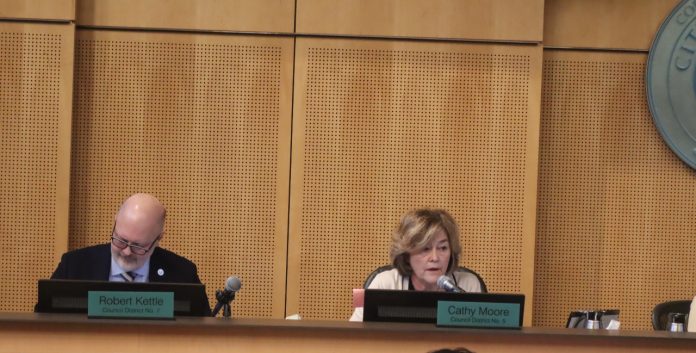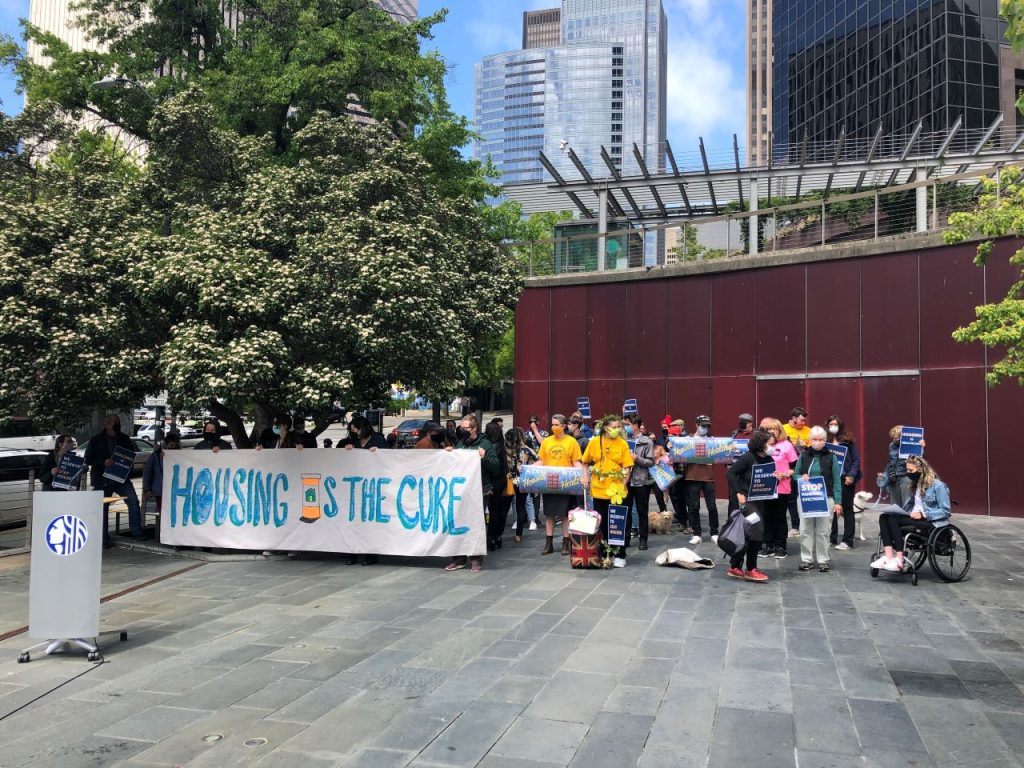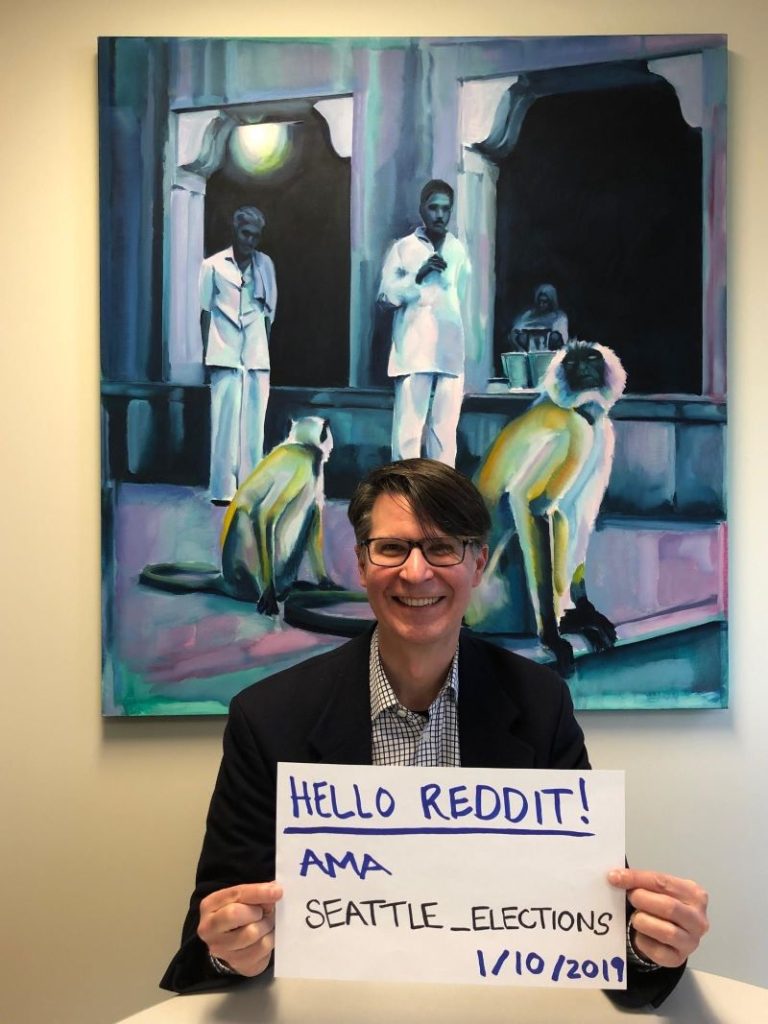
Seattle Councilmember Cathy Moore announced Friday that she is withdrawing her proposal to weaken the City’s ethics rules. This comes after the legislation was approaching a full council vote after passing the Governance, Accountability, and Economic Development Committee in a 2-0 vote (with three abstentions) on May 22.
“My conversations with colleagues have made it clear that we require more time to ensure we get this right. I began this process because of input from the City’s Seattle Ethics and Elections Commission, which highlighted how our current code places too much discretion in the hands of one unelected individual to make decisions that potentially disenfranchise district voters,” Moore said in a statement. “It’s important to acknowledge that Seattle’s Ethics Code is unusually rigid and an outlier across the nation. As the Chair of the Ethics and Elections Commission noted, there is no ‘gold standard’ when it comes to defining ethics rules; it’s a policy choice.”
Despite tabling the legislation for now, Moore made it clear she intended to revisit the policy issue: “As the Council further discusses the appropriate policy choice for our city, it’s my hope that we can collaborate to find a standard that both upholds the accountability of elected officials and preserves the integrity of our system, without impeding the essential functions of local government.”
The ethics proposal came in advance of expected legislation to slash tenant protections. As several councilmembers are landlords, they would have had to recuse themselves under existing rules. Under the proposed reform, however, they would have been allowed to vote.

Anyone who has served on a public commission or committee in any jurisdiction in Washington State has likely taken an ethics training course. Mandated by RCW 42.23, municipal employees are prohibited from using their positions to advance their personal financial interests with their jurisdictions. State law makes it clear state officers and employees are explicitly prohibited from having a financial interest in any discharging of the state officer’s or employee’s duties.
Recusing oneself from votes where there’s a clear conflict or financial interest is standard practice, and state law lays out legal repercussions for violating these laws even as a volunteer appointee on a commission.
Mirroring the Abundance Agenda’s call for selective efficiency at the local level, the justification from Moore’s earlier statements appeared to be a practical one: “It’s what this new Council has witnessed first-hand since taking office in 2024 – the system isn’t functioning as intended. This has been frustrating for the legislative process. It also comes at the expense of voter representation within our district representation system.”
Moore’s proposed legislation would have clarified some ethical requirements. For instance, it specifies that the written disclosure of a conflict of interest ought to appear on the official’s City webpage. It also defined an elected official and clarified “elected official” to mean the Mayor, City Attorney, and the members of the City Council.
However, what got the most attention is the glaring change to the prohibited conduct section of the Ethics Code: removing recusal requirements for elected officials. Instead, so long as the elected official discloses a financial interest or conflict, they can vote on a legislative matter.
Moore said Wayne Barnett, the Executive Director for the Seattle Ethics and Elections Commission was the initial requester of the legislation. Barnett argued that the recusal requirements rob voters of representation. “There are times when I think everyone should just know,” Barnett told Cascade PBS. “If you put out in public what your interests are, then you can either recuse yourself or go forward. And you’re going to be held accountable for the decision you make by your voters.”

There are two arguments for the legislation based on Moore’s and Barnett’s statements: the citizens of Seattle lose representation when their representative cannot vote, and the process is stymied by recusal requirements. However, the legislation did not address either of these concerns.
In his 2009 Weapons of Self Destruction special, Robin Williams quipped: “If you want to know how your congressmen and senators are going to vote, we should actually, maybe they should be like NASCAR drivers. They should actually have to have jackets with the names of all the people who are sponsoring them. Wouldn’t that be cool? Then you might have a clue to why (…) they voted that way.”
Moore’s proposal would take us closer to that dystopian reality, where legislation that favors the rich and powerful is just good politics. In the absence of a strong ethical framework, the politicians with the fullest NASCAR jackets are likely to prevail, since they would get rid of the laws that prevent them from enriching themselves or their benefactors.
It ought to be a simple process: if you have a conflict, report it, and ethically one would be expected to recuse themselves if they stand to benefit from it. What sets Seattle apart is their higher ethical standards. While Barnett is correct that the Massachusetts State Ethics Board does not require recusals, other states and municipalities do have a prohibition.
For instance, Alabama statute prohibits members from any county or municipal agency, board, or commission from voting or participating “in any matter in which the member or family member of the member has any financial gain or interest.”
California, a more ideologically aligned example to Seattle and Washington, “disqualifies” public officials from engaging in decisions that would potentially enrich themselves or family members. This does not create an impediment to the legislative process. Rather, it improves the policy process by removing impairments on the part of elected officials so their votes are reflective of their constituents and not personal gain.
On the point of efficiency, the policy making process in Seattle has always been notoriously slow. There is a reason why political scientists dubbed the term “the Seattle Process.” Seattle and Washington are unique in how slow and deliberate they are in offering chances for community input, just as much as it does at times revere process over results. That slowness and thoughtfulness is what leads to better crafted policies, just as much as it frustrates others. No doubt, there are ways in which it could be improved, but sacrificing the public interest by allowing electeds to potentially vote for their private interest does not address these inefficiencies.
However, based on the comments made by Moore and Barnett, there is an underlying debate about this legislation: improving the democratic process.
Representation is core to a democratic process. But so is accountability, equality, and the principle of anti-corruption. Part of all of these principles culminate in the law being equally applied to all within a democracy. Electeds acting in their official duties to cast votes on legislation that could personally enrich themselves by a standing conflict of interest runs roughshod over that principle of equality. Simple transparency is not enough. There needs to be enforcement and repercussions outside the ballot box.
And, to prevent a scenario even reaching that level of severity, it would behoove any government to prevent an elected official from acting on their official duties if it could personally enrich themselves altogether. If we are referring to a vote, and a councilmember could feasibly vote in favor of their interests or against their interests, in what circumstance would they vote against their interests?
The assumption at play is that councilmembers will always act in good faith and recuse themselves without the requirement or still vote for their district’s interests rather than their own personal interests. Anyone would reasonably hope and pray that electeds act in good faith. However, that is not why the law is there. If humans were angels, government would not be necessary. Ethics codes and the recusal requirements are there for a reason: so that there is not even the temptation or appearance of corruption in a given council vote. It is not for when electeds engage in self-serving behavior, it is to prevent them from doing so. To remove those requirements is to not engage with the democratic process, but to warp it.
With ranked-choice voting on the way to the Emerald City in 2027 and the Democracy Voucher Renewal Campaign kicking off for the November ballot, measures that increase democratic representation, it is a severe irony that the Council moved a proposal to effectively lower their ethics standards.
We continue to have a federal administration that blatantly violates the rules, and a president that has used his position to personally enrich himself. And because he is the president, as the Roberts-led Supreme Court has deemed, he is beyond reproach and being held accountable for those actions.
Corruption, as it should be bluntly called, is not democratic. Rather, it is an abjuration, an outright perversion, of the popular will. Instead of the popular will of the general public or the voters being honored in the votes by electeds, it is perverted to serve the interest of the elected, not the electors. It does not have to be gold bars stashed in your home or accepting a luxury jet, it could be as simple as making a quick buck at the public’s expense.
If the Seattle City Council intends to move forward with changes to their Ethics Code, then there ought to be additional requirements to avoid accusations of the council lowering their ethics standards. As part of their service to their communities and the city, they are serving the public.
To even avoid the appearance of corruption or conflict, there is a simple answer: divest entirely from outside businesses or not vote on matters that you could personally benefit from. Afterall, their attention ought to be wholly on the legislative matters of the city. And as The Urbanist reviewed last year, Seattle provides councilmembers with the most generous compensation to deal with the cost of living than any other municipality in the region.
If it is such a burden for the legislative process for councilmembers to not only disclose any financial conflicts of interest but also recuse themselves from voting on bills that would impact those same financial conflicts of interest, then maybe those councilmembers should not be on the Council at all. Polling numbers suggest many Seattleites agree.

Collin Thrower
Collin Rhys Thrower has long had an interest in policy issues that affect lives – whether it is healthcare, welfare, civil rights, or democracy itself. He sees politics as a puzzle, trying to solve systemic problems that have the chance to either do great good in the world or enact great harm. Born and raised in San José, California, Collin has a thirst for knowledge, learning, and growing in new spaces. Residing in Tacoma, Collin has a Master's in Political Science from Northeastern University.
